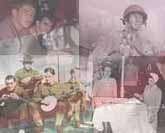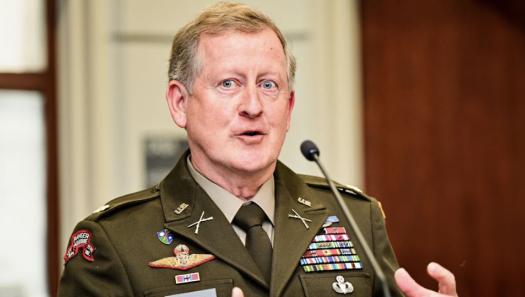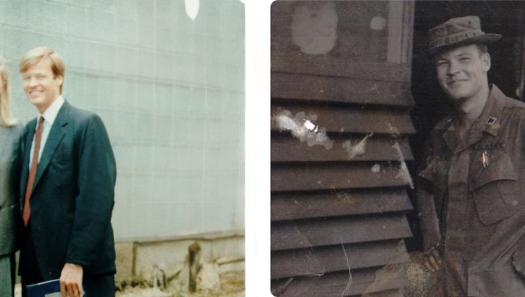Military & Veterans News
Cover Story: History Project Captures Veterans' Stories
Courtney Brooks

WASHINGTON -- The great wars are usually remembered for their bloodiest battles, most decorated heroes, and historic treaties. Rarely do the soldiers and civilians on the home front have an opportunity to voice their individual experiences.
The Veterans History Project is giving soldiers a chance to relay these personal stories. Project organizers are encouraging Americans of all ages to participate in a mission to capture and chronicle oral histories from America’s war veterans. The stories will become a collection in the Library of Congress’ American Folklife Center in Washington, D.C.
Volunteers interview veterans, collect letters, photographs and journals from former service members of World War I, World War II, and the Korean, Vietnam and Persian Gulf Wars, as well as the civilians who supported them. Most importantly, the project seeks to honor the individual’s experience, said Ellen McCulloch-Lovell, director of the Veterans History Project at the Library of Congress.
"We’re not attempting to patch together a complete history of every war," said McCulloch-Lovell. "We’re trying to let people talk about their experiences and what meant the most to them."
The personal wartime accounts have preserved history that may have otherwise been forgotten, said Charlie Mendoza, vice president of membership and member services for the American Association of Retired Persons, a founding sponsor of the project.
"In New York, I witnessed an interview with a young man from a college interviewing a man who used to use Navajo code with the Marine Corps in World War II," Mendoza said. "I thought, 'That’s terrific.’ That’s something that might have been lost."
Wartime accounts are an important part of America’s history, he said. "Not only does war change a lot of countries; it changes nations, it changes people," Mendoza said. "With every war that has taken place, changes take place on the home front."
Mendoza encourages all Americans to become involved with interviewing veterans. He believes everyone, particularly youth, have a lot to benefit from the project.
Eleven-year old Edward Litten has taken it upon himself to interview some 20 veterans since April. The "Young Marine" has conducted the interviews at the Southeastern Michigan Veterans Service Center near his home in Monroe, Michigan. Litten volunteered three days per week the entire summer and after school every day during the school year, hoping to catch a veteran to interview.
"I think it’s really cool to hear all the veteran’s stories and just know the fact that they’re not going to be forgotten," Litten said. "Some of the stories are really sad because not everything in the war was really cool."
Veterans have also gleaned new understanding from interviews by a younger generation.
A Korean and Vietnam veteran himself, Mendoza was interviewed by his youngest daughter. He said that the experience helped bridge generational gaps, which he said is one of the goals of the project.
"It has gotten us a lot closer, honestly," said Mendoza. "They wanted to know, 'Why was dad gone so much?’ and 'Why wasn’t dad around?’ when they were younger."
Capturing civilians’ stories from the wartime eras are also important, Mendoza added. "That’s an important part of our collective memory, not just the people who went off to service."
Authorized by Congress through the enactment of Public Law 106-380 and signed into law by President Clinton on October 27, 2000, the Veterans History Project has chronicled histories of approximately 1,500 veterans to date.
McCulloch-Lovell hopes to reach much larger masses for the historical collection. The project will be ongoing with goals of reaching millions of people, she said.
Although she missed out on the opportunity to interview her own father, who served in the Navy in World War II, she was able to help her mother make 1,800 copies of his letters to her. She realized how precious this opportunity was and invites others to share in the experience.
Litten agreed that the experience has been worthwhile, even though he has spent quite a bit of time going to Michigan’s Flat Rock Speedway picking up deposit bottles to pay for the postage and videotapes for the interviews being sent to the project’s headquarters.
To become involved with the project, visit the Veterans History Project Web site at www.loc.gov/veterans or call the toll-free number at 1-888-371-5848.
"I just feel like I’m doing my part in history and making sure that people remember all the stories and all the wars," Litten said. "There are only two wars in my history book anymore-the Revolutionary War and the Civil War, and there’s not too much on those wars at all."
McCulloch-Lovell said that other youth and adults can get involved in the ongoing project by accessing the Veterans History Project Web site or calling a toll-free number, which provides guidelines for partners and volunteers. A project kit, with instructions, for people who would like to interview veterans is available on the Web site.
More than 420 organizations have partnered with the project, including veterans’ service organizations, historical societies, libraries, museums, military archives, colleges and universities, military historical groups, and heritage areas.
The oral histories and documents collected will be part of the national Veterans History Project Collection at the Library of Congress and other recognized repositories, McCulloch-Lovell said. Eventually, portions of the material will be available digitally on the Library of Congress Web site, she added.
SOURCE: Army News Service via Veterans News and Information Service
Frequently Asked Questions
How can I get a copy of the Project Kit?
The Project Kit is available online at: http://www.loc.gov/folklife/vets/kit.html. A printed version can be ordered by sending email to: [email protected]
Is the Veterans History Project only interested in World War II?
No, the Project is collecting materials from World War I, World War II, and the Korean Vietnam, and Persian Gulf wars.
How can I get interviewed?
While the Veterans History Project does not do the actual interviewing, you are encouraged to conduct an interview yourself, or have a friend or family member do it with you. The project kit explains how simple this can be. Also, many of the partner organizations do interviewing. Check the List of Official Partners to locate a partner near you.
I’m not a military veteran, but I contributed to the war effort as a civilian. Do you want my story?
Yes, the Veterans History Project is collecting stories and materials from the homefront as well as from the battlefront. Any wartime veteran or civilian who worked in support of the war has a story that we are interested in.
How did the Project get started?
The United States Congress created the Veterans History Project in 2000. The authorizing legislation (Public Law 106-380), sponsored by Representatives Ron Kind, Amo Houghton, and Steny Hoyer in the U.S. House of Representatives and Senators Max Cleland and Chuck Hagel in the U.S. Senate, received unanimous support and was signed into law by President William Jefferson Clinton on October 27, 2000.




